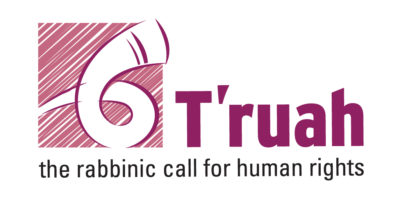NEW YORK — T’ruah: The Rabbinic Call for Human Rights today voiced strenuous opposition to the proposed Antisemitism Awareness Act, warning the bill poses a grave threat to religious freedom and free speech.
Rabbi Jill Jacobs, CEO of T’ruah, issued the following statement:
“We are alarmed by the rise in antisemitic incidents across the country and are in touch regularly with rabbis and community members contending with bomb threats, violence, harassment, and graffiti. Bold and decisive action is desperately needed to confront this vile hatred. The Biden administration took a strong step toward combating antisemitism with the U.S. National Strategy to Counter Antisemitism. However, the profoundly misguided Antisemitism Awareness Act does nothing to keep Jews safe, while also threatening the civil liberties fundamental to this country.
“This ill-conceived bill recklessly attempts to enshrine the International Holocaust Remembrance Alliance (IHRA) ‘working definition’ of antisemitism into federal law. The IHRA definition was explicitly intended as non-legally binding guidance for educational purposes only and was never meant to be codified into law. There should not be a codified definition of antisemitism, just as there is no codified definition of racism, homophobia, xenophobia, Islamophobia or any other bigotry. Federal and state agencies, universities, and other institutions evaluating potential instances of bigotry can and should consider the specific situation, rather than relying on overly broad definitions.
“The examples included within the IHRA definition threaten to weaken First Amendment protections by restricting the right to protest Israeli actions or to call for a boycott of the country. While we do not support or participate in boycotts of Israel, we affirm that boycotts are protected free speech, and that Americans have the right to boycott any country or company with whose policies they disagree.
“Instead of pursuing this divisive and misguided avenue, we urge Congress to prioritize fully implementing the U.S. National Strategy to Counter Antisemitism. This comprehensive plan, developed through extensive consultation with diverse stakeholders, provides a holistic framework to fight antisemitism through education, community partnerships, security initiatives, and other proactive measures — while upholding America’s bedrock of religious freedom.
“In addition to voicing our opposition to this legislation, we call on the Senate to ensure the Antisemitism Awareness Act goes through normal order and receives full scrutiny in committee. A bill with such potential to undermine core constitutional protections must not be rushed through without thorough vetting and debate.
“Protecting freedom of speech and assembly is a constitutional cornerstone. T’ruah remains firmly committed to combating the scourge of antisemitism in cooperation with all communities. However, we should not do so in a way that risks violating fundamental rights. For these reasons, T’ruah strongly opposes the Antisemitism Awareness Act.”
###
About T’ruah: The Rabbinic Call for Human Rights
T’ruah: The Rabbinic Call for Human Rights mobilizes a network of more than 2,300 rabbis and cantors from all streams of Judaism that, together with the Jewish community, act on the Jewish imperative to respect and advance the human rights of all people. Grounded in Torah and our Jewish historical experience and guided by the Universal Declaration of Human Rights, we call upon Jews to assert Jewish values by raising our voices and taking concrete steps to protect and expand human rights in North America, Israel, and the occupied Palestinian territories.

